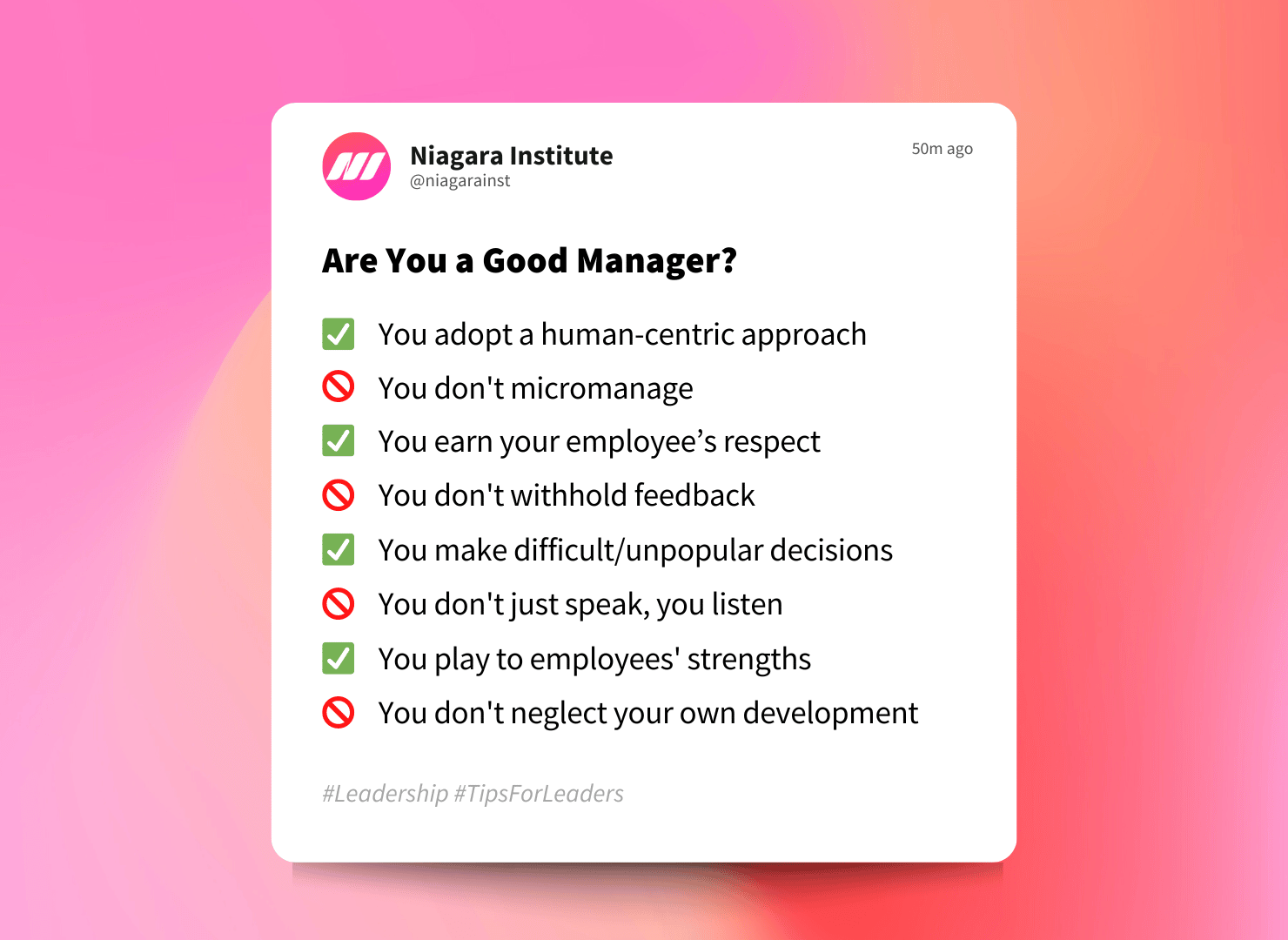5 min read
How To Be a Good Manager: A 30-Day Roadmap for Leaders
Getting promoted and receiving a management position is the first step in becoming a leader. However, being a good manager will take much more than a...
.png)
You likely had one of two goals when you stepped into people management. You either wanted to be a better people manager than your worst boss or even a fraction as good as the best boss you ever had.
You didn’t set out to be the absolute greatest; you simply wanted to be a good manager for the people in your charge and yourself too. The kind of manager that you always wanted to work for when you were an individual contributor. It’s an admirable goal that, if you work hard to achieve, can get you far as a leader and fill you with a profound sense of pride and purpose.
This begs the question, as of this moment, are you a good people manager? Have you achieved your goal? While the definition of a good manager will differ slightly depending on your experience, there are several universal skills, traits, and behaviors that good managers do and do not exhibit that you can use to measure your progress.

If you’re a good people manager, you don’t just see your employees as employees. You see them as people and treat them as such by demonstrating vulnerability, empathy, compassion, authenticity, and transparency in your interactions with them. This is called human-centric leadership and as Josh Bersin explained, “Traditional leadership is all about performance, profitability, deadlines, projects, status reports, and results; whereas, human-centered leadership puts people first and makes success happen with people, not despite them.”
82% of employees feel it is important that they’re seen as a whole person at work, not just an employee. When this happens, Gartner found that it’s possible to see a 37% increase in the number of employees reporting high engagement. In turn, these highly engaged employees are also known to improve their team’s performance by up to 27%.
It can be tempting to micromanage employees, especially when they are working remotely and you can’t physically see what they’re doing like you once could when you were in an office together. If you’re a good people manager, you will resist that temptation. You will constantly remind yourself of all the reasons your employees have proven that you actually can trust them to deliver the results you expect, even if they don’t do it the exact same way you might have.
59% of employees say they have worked for a micromanager at some point in their careers, which is concerning given that 68% said it decreased their morale and 55% said it hurt their productivity. Meanwhile, 48% of remote workers say they felt micromanaged by their manager in 2022, and 66% claim that caused them to feel more burned out.
A good people manager realizes they cannot just demand respect. If you want it, you have to earn it and to do that, you must be willing to show your employees the same level of respect you expect them to reciprocate. So, for example, if you wish your employees to respect your time by showing up to staff meetings on time and prepared, you must respect their time similarly.
In 2022, a study by Pew Research Center revealed that feeling disrespected at work was the third most popular reason US employees left their job in 2021. It came in just behind low pay and a lack of advancement opportunities, which speaks volumes about just how important it is to employees. Not to mention, those who feel respected by their managers report 56% better health and well-being, 89% greater enjoyment and satisfaction with their jobs, and 92% greater focus and prioritization.
If you’re a good people manager, you provide employees with in-the-moment actionable and constructive feedback. Rather than withhold that information until a monthly check-in meeting or, worse, an annual performance review, you provide feedback as soon as possible to give them a chance to improve long before it becomes a more significant issue.
When respondents were asked by Gallup how often they received feedback from their manager, 19% said once a year or less, 28% said a few times per year, and 27% said a few times per month. According to employees, though, this isn’t cutting it, as 63% say they want more in-the-moment feedback. Even employees who tend to receive negative feedback from their managers wish they'd get more feedback.
No one in leadership looks forward to making difficult or unpopular decisions that they know their direct reports won’t entirely agree with. A good people manager, though, will realize that this is an inevitable part of the job and focus their efforts on learning how to navigate these types of decisions head-on rather than avoiding them.
When Zety asked employees what they believe makes a good manager, respondents' placed strong decision-making skills among the top five things. Not to mention, the ability to make sound decisions in leadership has been found in separate studies by both McKinsey and Bain & Co. to impact the overall organization’s financial performance positively.
Your communication skills can make or break your ability to be a good people manager. But it’s important to remember that a significant component of effective leadership communication is listening to others. It’s as the American basketball coach, John Wooden, once said, “One of the requirements of good leadership is the ability to listen - really listen. An effective leader is very good at listening, and it’s difficult to listen when you are talking.”
In 2021, Penn State University found that when managers actively listen, it can improve employees’ sense of personal control over their careers and reduce their anxiety about potential job loss. Not to mention, when employees feel listened to and heard in the workplace they are 4.6x more likely to feel empowered to do their best work.
It can be highly demotivating for employees to work for a leader who focuses and dwells on all the things they aren’t good at. It’s why good people managers will play to their employee's strengths instead. For example, if your employee isn’t comfortable public speaking, but you know they’re a strong writer, you can motivate and engage them by finding opportunities for them to flex their strengths instead of fixing their weaknesses.
According to an extensive study conducted by Gallup, playing to employee’s strengths has been found to lead to a 10% to 19% increase in sales, a 14% to 29% increase in profit, a 3% to 7% increase in customer engagement, and a 9% to 15% increase in employee engagement.
As a people manager, it can be all too easy to get wrapped up in the development needs of your direct reports and neglect your own, even if you don’t mean to. This is something a good manager will actively work to avoid, though. After all, the time and energy you invest into honing your leadership skills, learning new tools, and mastering new techniques through training or coaching benefit everyone, especially those in your charge.
Leadership development has always been crucial to the success of those in people management. For instance, leadership training has been found to improve leaders learning capacity by 25% and their performance by 20%. Moreover, given that only 27% of leaders in 2022 say they are very effective at leading hybrid or virtual teams and that remote/hybrid leadership is the new reality for many people, it’s even more important to close that leadership skills gap before it becomes detrimental to not just leaders, but those they lead.

5 min read
Getting promoted and receiving a management position is the first step in becoming a leader. However, being a good manager will take much more than a...
.png)
7 min read
People management is all about one thing - people. It’s about ensuring the people in your charge have everything they need to do their job and do it...
.png)
7 min read
Do you want to be a great manager but it feels like you never have enough time and brain capacity to possibly meet everyone’s needs of you? If so,...